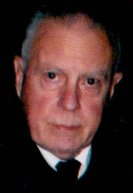County Limerick Beekeepers' Association
Past Meetings of the Association
2016
Success for Our Members at the Clonmel and Banner Honey Shows
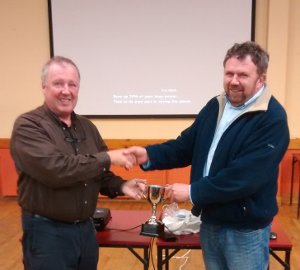
Results for Limerick Beekeepers who entered in to various categories in the recent Clonmel Honey Show.
Confined Limerick & Clare Beekeepers 3 x Jars of run honey:
Winner: Donal Cooper
Highly Commended: Wesley Power
Novice class 3xJars of run honey
Very Highly Commended: Kathy Cooper
Honey Comb
Commended: Gus McCoy
Baking Competition/s
Plain Honey Cake:
Winner: Kathy Cooper
Honey Fruit Cake
3rd place: Michelle Russell
Very highly commended: Kathy Cooper
Miscellaneous Section:
Honey, lemon and ginger cough syrup:
2nd Place: Pauline Walsh
October Meeting
Speaker: John Breen
Topics:
1: Aspects of Bee Biology
2: An Update on the National Apicultural Programme
September Meeting
Speaker: Irene Power
Topic: Preparing for Winter
Members Visit the Association Apiary
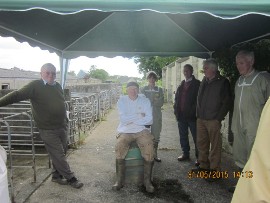
The inaugural members' event at the association apiary took place on Sunday 31st May 2015. In spite of the poor weather, those that attended had a good and informative day. Read on....
Visit to South Tipperary Beekeepers' Association:
Photos taken last Monday 25th May where we were hosted by South Tipperary Beekeepers Association. Tom Prendergast took a group who were beekeeping for a number of years and the Beginners group were instructed by Irene & Jim Power.
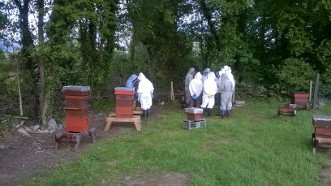
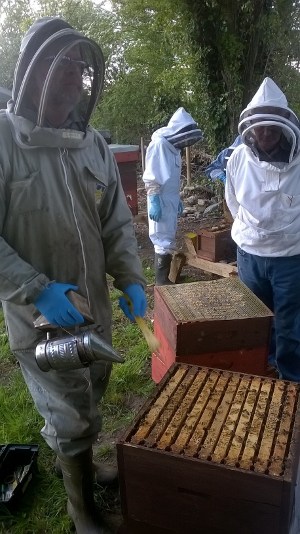
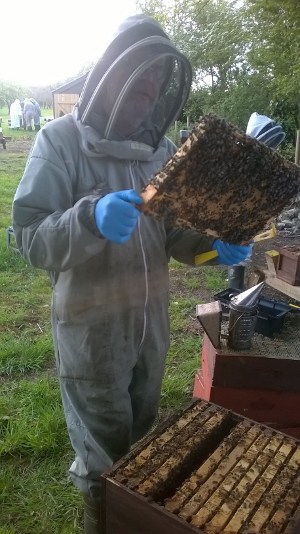
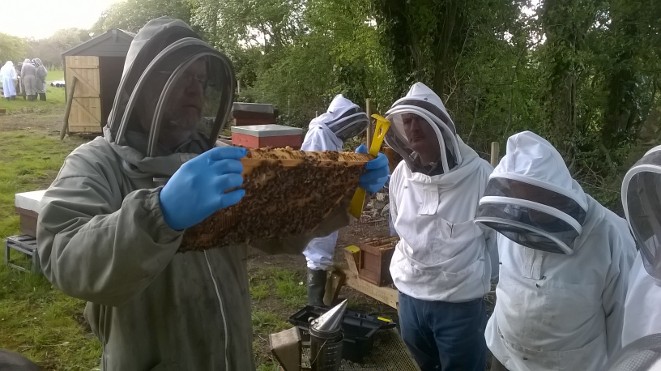
Previous Meetings:
May Meeting
Speaker: Irene Power
Topic: 'At the Hive Entrance'
April Meeting
Speaker: Gerry Ryan
Topic: 'Making Apideas'
March Meeting
Speaker: Tom Prendergast
Topic: 'Opening the Hive'
Purchase of Honey Extractor:
The Association has purchased an extractor for use by members, please use one of the following links to view the guidance document:
Use of Honey Extractor - Terms and Conditions (PDF format).
Use of Honey Extractor - Terms and Conditions (Word/odt format)
Membership
Membership for 2016 is due to be paid at the AGM for members and intending members.
The Fee for 2016 is €50 which was agreed at the Committee meeting on 21/10/13.
Of this, €30 goes to The Federation of Irish Beekeeper's Associations.
Full membership covers:
- 1. The Federation Affiliation Fee
- 2. 3rd party public liability insurance for the year
- 3. Each member will receive a copy of An Beachaire in the post for 11 months of the year.
Associate Membership
FIBKA rules determine that only full members of another Association are eligible to apply for Associate membership. Associate membership is fixed at €10.
Membership and Associate membership includes attendance at Limerick Beekeepers Association Lecturers,
meetings and mentoring throughout the year.
Liam still has sugar for sale. (available to members only) Please phone 0868070674
Back to Notice Board
2015
February Meeting
At our February meeting we were treated to a talk by the President of FIBKA, Eamon Magee. His subject was the 'The Labelling of Honey'. We also had in attendence pupils from Desmond College who displayed work on Varroa which they entered in to the recent Young Scientist Exhibition. Also, members who had passed their preliminary exam in the last year were presented with their certs by the FIBKA President. The following photos were taken on the night.
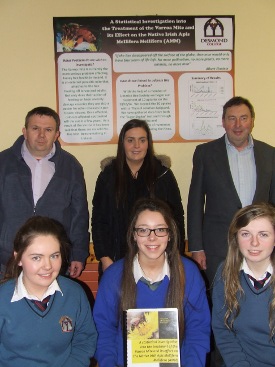
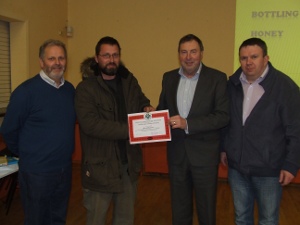
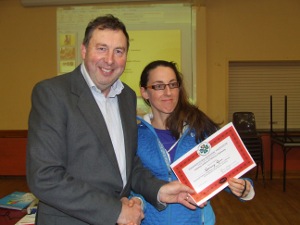
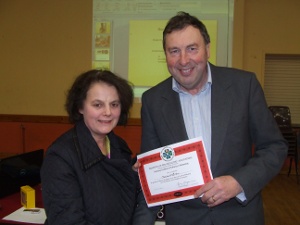
Photos taken at the last meeting.
2014
AGM
The Annual General Meeting took place at Mungret GAA on Thursday 13th November at 8pm. The election of officers and committee will take place. Annual subscription of €50 is due.
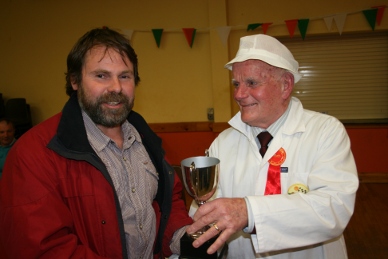
Jean-Louis takes the trophy!
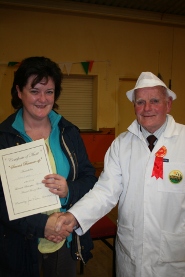
At the members honey show held on Thursday 9th October our winner was Jean-Louis Valentin. First runner-up was our (ahem...) Secretary Gus McCoy. Second runner-up Kathy Cooper. Congratulations to all.
Thanks to all who submitted entries and thanks especially to our judge Jim Power with wife Bridie and with Irene on hand too.
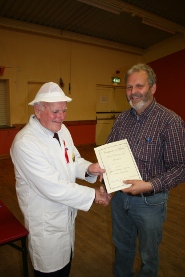
All photos by Frank Corbett

Talk on Mead-Making by David Lee
As well as our Honey Show we were given a fine talk by David Lee on the art of making mead.
Previous Meeting: Speaker: John Donoghue. Topic: Honey for Show
Held on Thursday 11th September at Mungret GAA.
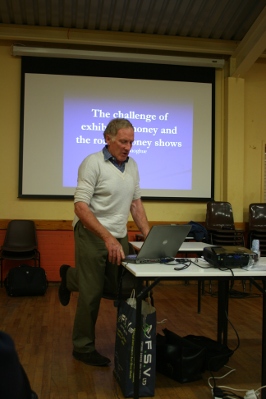
And on the subject of Honey for show, the South Tipperary Beekeepers'Association Annual Honey Show (aka Clonmel Honey Show) 2014 is to take place on 20th/21st September. Further information here.
Meeting Thursday 12th June:
Lecture: Swarm Control
Presenter: Irene Power
Meeting (Thursday 8th May)
Speaker: Professor John Breen
Subject: Honeybees and other bees
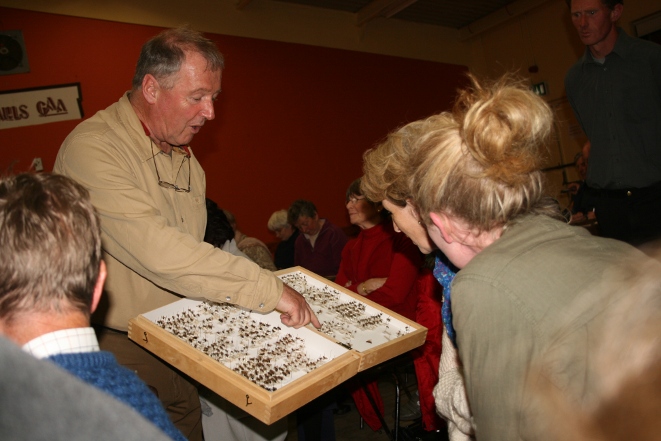 John with one display box from his collection. Photo by Frank Corbett
John with one display box from his collection. Photo by Frank Corbett
Purchase of Honey Extractor:
The Association has purchased an extractor for use by members, please use one of the following links to view the guidance document:
Use of Honey Extractor - Terms and Conditions (PDF format).
Use of Honey Extractor - Terms and Conditions (Word/odt format)
Membership
Membership for 2016 is due to be paid at the AGM for members and intending members. The Fee for 2016 is €50 which was agreed at the Committee meeting on 21/10/13. Of this, €30 goes to The Federation of Irish Beekeeper's Associations.
Full membership covers:
- 1. The Federation Affiliation Fee
- 2. 3rd party public liability insurance for the year
- 3. Each member will receive a copy of An Beachaire in the post for 11 months of the year.
Associate Membership
FIBKA rules determine that only full members of another Association are eligible to apply for Associate membership. Associate membership is fixed at €10. Membership and Associate membership includes attendance at Limerick Beekeepers Association Lecturers, meetings and mentoring throughout the year.
Liam still has sugar for sale. (available to members only) Please phone 0868070674
February Meeting
At our February meeting we were treated to a talk by the President of FIBKA, Eamon Magee. His subject was the 'The Labelling of Honey'. We also had in attendence pupils from Desmond College who displayed work on Varroa which they entered in to the recent Young Scientist Exhibition. Also, members who had passed their preliminary exam in the last year were presented with their certs by the FIBKA President. The following photos were taken on the night.




Photos taken at the last meeting.
AGM
The Annual General Meeting took place at Mungret GAA on Thursday 13th November at 8pm. The election of officers and committee will take place. Annual subscription of €50 is due.

Jean-Louis takes the trophy!

At the members honey show held on Thursday 9th October our winner was Jean-Louis Valentin. First runner-up was our (ahem...) Secretary Gus McCoy. Second runner-up Kathy Cooper. Congratulations to all.
Thanks to all who submitted entries and thanks especially to our judge Jim Power with wife Bridie and with Irene on hand too.

All photos by Frank Corbett

Talk on Mead-Making by David Lee
As well as our Honey Show we were given a fine talk by David Lee on the art of making mead.
Previous Meeting: Speaker: John Donoghue. Topic: Honey for Show
Held on Thursday 11th September at Mungret GAA.

And on the subject of Honey for show, the South Tipperary Beekeepers'Association Annual Honey Show (aka Clonmel Honey Show) 2014 is to take place on 20th/21st September. Further information here.
Meeting Thursday 12th June:
Lecture: Swarm Control
Presenter: Irene Power
John was recently on Living the Wildlife presented by Colin Stafford-Johnson on RTE, talking about wood ants. You can use this link to see this programme. But please be careful if you are having to ration your data units. There is an option to reduce the quality but I think even this lower quality is still quite high = data-draining.
Previous Meeting held on Thursday 17th April: Mary Coffey: Bee Diseases and their Management
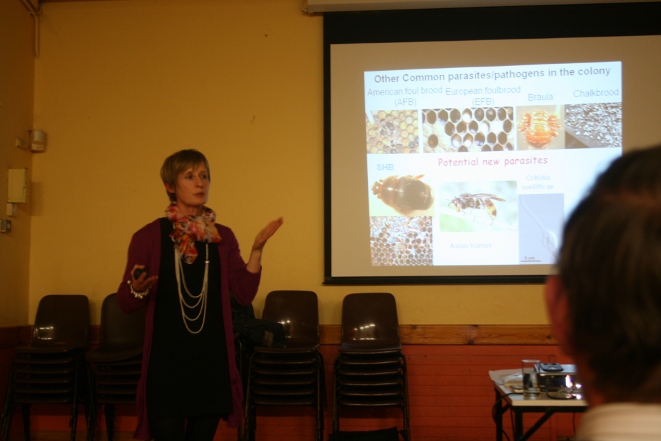 Mary Coffey giving her talk. Photo by Frank Corbett
Mary Coffey giving her talk. Photo by Frank Corbett
A positive and very successful meeting and lecture given by Mary Coffey in the bright surroundings of Mungret GAA clubhouse, which we hope will continue and grow into a long term partnership by Mungret hosting our meetings in to the future and it becoming a permanent home for County Limerick Beekeepers Association. - Gus McCoy (Secretary).
Of note is that we were once again free to have a cup of tea! Members had expressed regret that the very important networking facilitated by this facet of our meetings was no longer possible at the South Court Hotel.
The talk itself was fascinating if a bit depressing with a seemingly determined and ever-growing series of threats to the health of our bees. Further information about bee diseases can be found at: Bee Diagnosis page of the FIBKA website.
Meeting of Monday March 10th: Denis Ryan: Candle Making
Thanks are due to Denis Ryan for his very practical demonstration of candle making. Gus has sent us all a copy of the notes provided by Denis. Here are some pictures taken on the evening, provided once again by Frank Corbett.
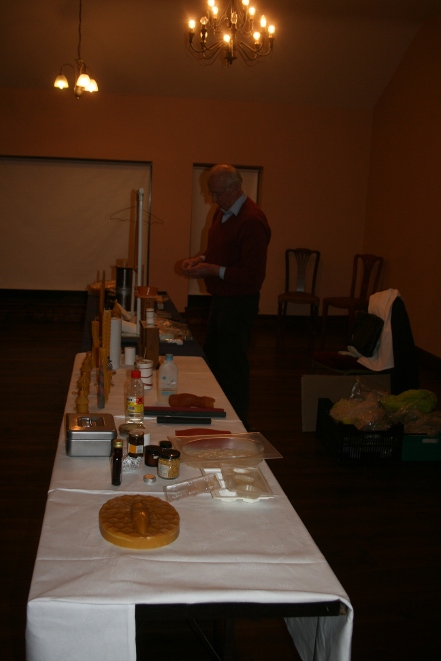
Denis Ryan and his candle-making display
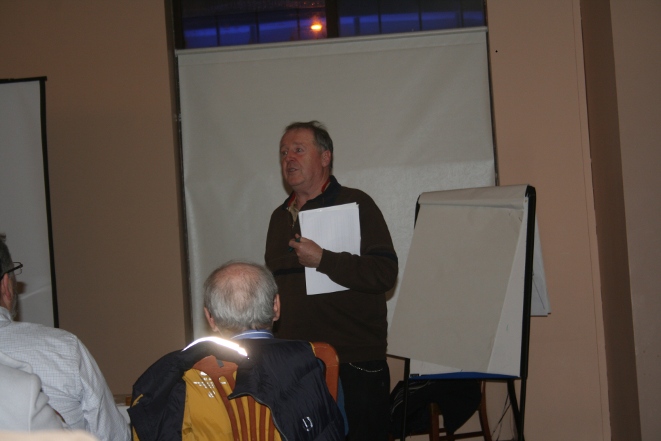
John Breen
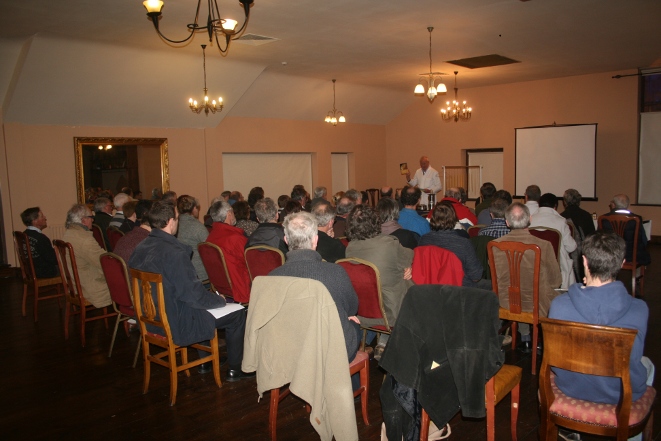
Photography by Frank Corbett
Thanks are due also to John Breen who gave us an update on the situation with regards to the licensing of and official advice in relation to the new MAQS varroa treatment. The advice John gave was re-iterated and expanded upon more recently by Mary Coffey at the last meeting.
Monday 10th February (Last Meeting)
Gerry Ryan gave us another excellent talk. This time on the subject of Spring Management. You can read a summary of the talk by using this link.
Meetings in 2013
Monday 18th November:
Annual General Meeting
Monday 14th October:
A members-only honey show took place. Participating members brought along 2 jars of run honey. The judges were Irene Power and her father Jim Power. We would like to thank both for their work and for their expert advice. They praised our efforts and gave some tips for the future. In particular they advised us to use only capped honey. Bees will cap the honey only when its moisture content has been sufficiently reduced so that when extracted the resulting product will have a higher viscosity (will be less runny). When a jar of such honey is upturned (with the lid in place!), a single air bubble will be seen to rise slowly to the surface. In contrast, with runnier honey the air will rise to the surface in a rush. We were also advised to improve filtering by use of finer or double filters.
Winners!
Winner: Paul Brennan
1st Runner-up: Matt Roche
2nd Runner-up: Liam Arrigan
Paul will be awarded the limerick Beekeepers Association perpetual cup along with a certificate of merit. The two runners-up also received cetificates.
While the judging was taking place, Leslie Hartigan gave a demonstration on his use of kingspan as hive insulation material. He also had time to give us a demonstration of the glass cutting techniques employed in the construction of transparent crown boards.
Monday 14th September
Redmond Williams gave an excellent presentation on honey extraction and presentation which was well received by all. He spoke from 8:15 to 10:00 p.m. and all without a break!

Redmond
Preliminary Certs Awarded:
Four members received their Preliminary Certificate of Proficiency in Beekeeping which were presented by Redmond Williams. (Frank Corbett took some photos) The four members are:
 John
John
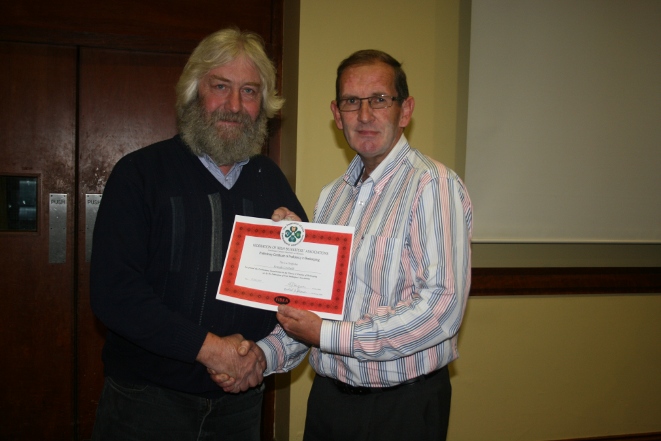 Frank
Frank
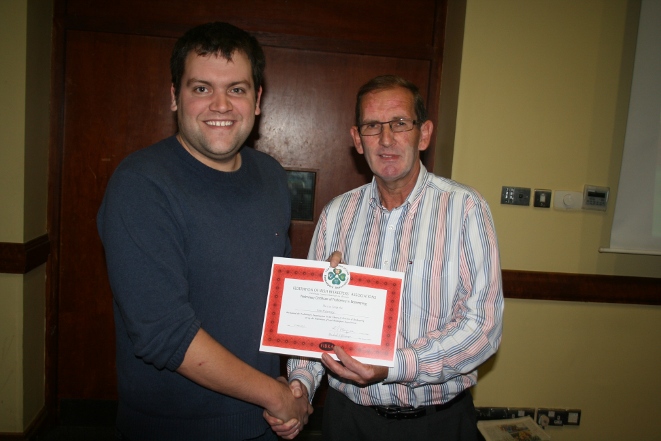 Joe
Joe
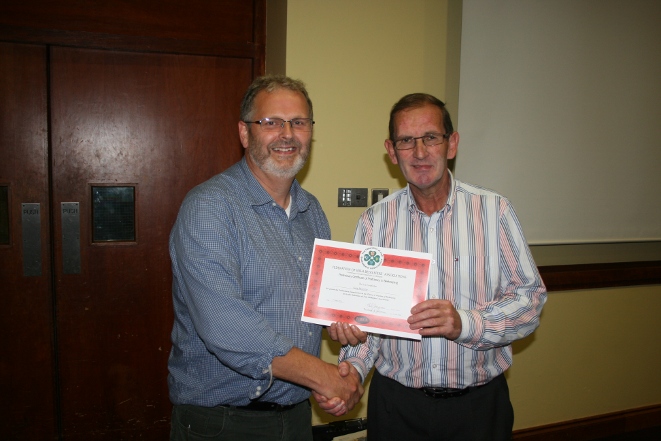 Gus
Gus
Just thought you might like to know that we had 31 paid up members and 14 new people attend Monday's Limerick Beekeepers Associations meeting, giving an attendance of 45 people on the night. - Gus
Back to Notice Board.
Back to Home Page.
10th June 2013: Beekeeping topics discussed
Members had left their questions in a box on the way in. We broke up into four groups:
Group 1: (Leader: Matt Roche)
The question put to the group was about a new swarm which had been repeatedly swarming and returning to the hive, in which the queen had been trapped using a section of queen-excluder across the entrance. In particular, the question asked whether one should provide a solid floor rather than an open floor with mesh? It was generally agreed that a closed floor (i.e. a mesh floor with a varroa tray inserted) would give the bees a greater sense of security and would help them to settle in quicker. The question also prompted a discussion of the possibility of a hive having more than one queen. Matt told us he once had 13 queens in a swarm! Leslie correctly surmised that this swarm must have been a cast, noting that he had never come across a prime swarm with more than one queen. Someone advised that putting brood into a swarm box would discourage re-swarming as the bees would be inclined to stay and look after them.
Group 2: (Leader: Pat Hayes)
This group's question dealt with queen-excluders. In particular with the thin galvanised queen-excluders that some have, there is a rough side and a smooth-side to these. Patrick explained that it is important to put the smooth side facing down as this will make it easier for the workers to pass upwards into the super. There should be no problem with the bees going down again even if the rough upper-side may slow them down as the bees have no choice: they will have to go back down to get to the entrance and off back out to collect nectar and pollen. Pat also expressed the view that the alignment of queen-excluder spaces should be at right-angles to the frames as this will limit the build-up of wild-comb. Patrick also wished to advise us to be wary of bees in thundery weather as even quiet bees can become aggressive in such conditions.
Group 3: (Leader: Sean Flavin)
The question for this group was about the advisability of buying bees advertised in magazines etc.. Well, as Sean said, it really is a matter of common sense and caveat emptor ("buyer beware" my dictionary tells me!) If the bees come from afar, apart from the question of suitability for our climate, we cannot easily check on the seller's reputation. There may be problems of disease or queens that are older than stated for example; another reason to buy from known and trusted sources. There was also the view expressed that bees should come with some kind of guarantee. Sean's view was that this would only be practicable in the very short term. That is, the bees should be checked for disease and shown to be healthy when delivered but after that their new owner is responsible for their well-being. Anything else would be unfair to the seller. A further opinion was expressed that bees should not be sold for "profit" at all. A different view put was that very few beekeepers, especially when the time involved is taken into account, can begin to think in terms of making a profit, regardless of whether they sell their bees or not.
Group 4: (Leader: Leslie Hartigan)
The last group had a question about a weak hive or at least a slow-to-build-up hive. Leslie advised that the best solution to this one was to feed. Feeding would mean that the housekeeper bees would need to spend less time foraging and have more time tending to the brood. Fewer bees out foraging would also mean more bees inside the hive and therefore keeping the brood temperature up. Leslie told us that the ideal birth-temperature for a bee is about 35 degrees Centigrade. Bees may survive at 30 degrees but they will only thrive if the temperature is somewhat higher, he said. The youngest beekeeper present asked the very good question as to what the maximum temperature should be - 40 degrees was the answer. Leslie recommended a contact feed using an upturned jar with small holes in the securely-tightened lid covering a hole in the crownboard. It is best to turn the jar upside-down over a saucer and leave it to stand until an airlock is formed above the solution. When the jar is put in position, the airlock prevents the sugar-solution running into the hive while at the same time, as the bees feed, air is only gradually allowed back into the jar. At first the bees may empty the jar quickly, so daily checking in the evening when the bees have quietened-down is recommended. As the hive builds up and if the weather is reasonable the bees will eventually prefer to forage for their food and feeding can cease.
While on the subject of a weak hive, Sean was keen to emphasise the importance of checking a weak hive for disease mentioning that one should send 30 healthy bees, "put to sleep" in the freezer overnight, off to Mary Coffey to be tested. FIBKA have a web page devoted to the subject of bee diseases on which the address for sending-off of samples to Mary Coffey is given.
The topic of the best kind of honey to give to allergy-sufferers was also raised. Pat Hayes was of the opinion that such honey should be very fresh indeed and very local. In these circumstances recovery should be immediate or within 24 hours. Leslie mentioned that he had customers who came up from Wexford to buy his honey as a remedy for allergies and who swore by it. In the end everyone agreed that if it works, that's the main thing!
A question was put to members about their views on the native black bee (apis mellifera mellifera) versus the Buckfast bee controversy. We were asked if members had a preference for one or the other and a show of hands was requested. Result:
Buckfast bee: 1 vote (in jest I think).
Native black bee: Everyone else?
Abstentions: There may have been some but no-one was counting.
Past meetings 2013:
Monday 11th February: Roundtable group discussions. (brainswarming?) • Monday 11th March: Speaker: Redmond Williams. Topic: Spring Management. • Monday 8th April.Speaker: Tom Prendergast. Topic: Swarm Control. • Monday 13th May. Speaker: Gerry Ryan. Topic: Queen Rearing. Monday 10th June. "Round-table" discussions: For a summary of these, please follow this link. Monday 9th September. Redmond Williams gave a talk on: Honey Extraction and Presentation. Monday 14th October: Association Honey show with judges, Practical demonstrations by Leslie Hartigan. Monday 18th November. (AGM). More information about these and other events can be found by going to the Notice Board.
Back to Notice Board